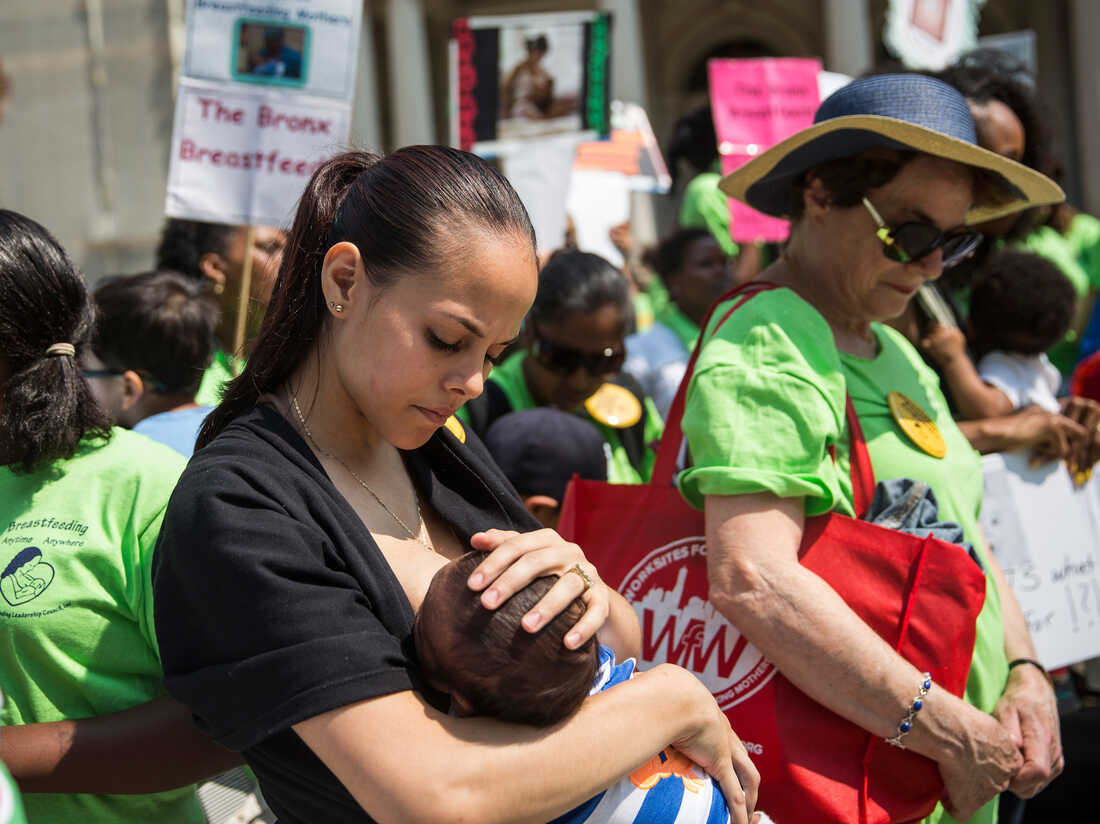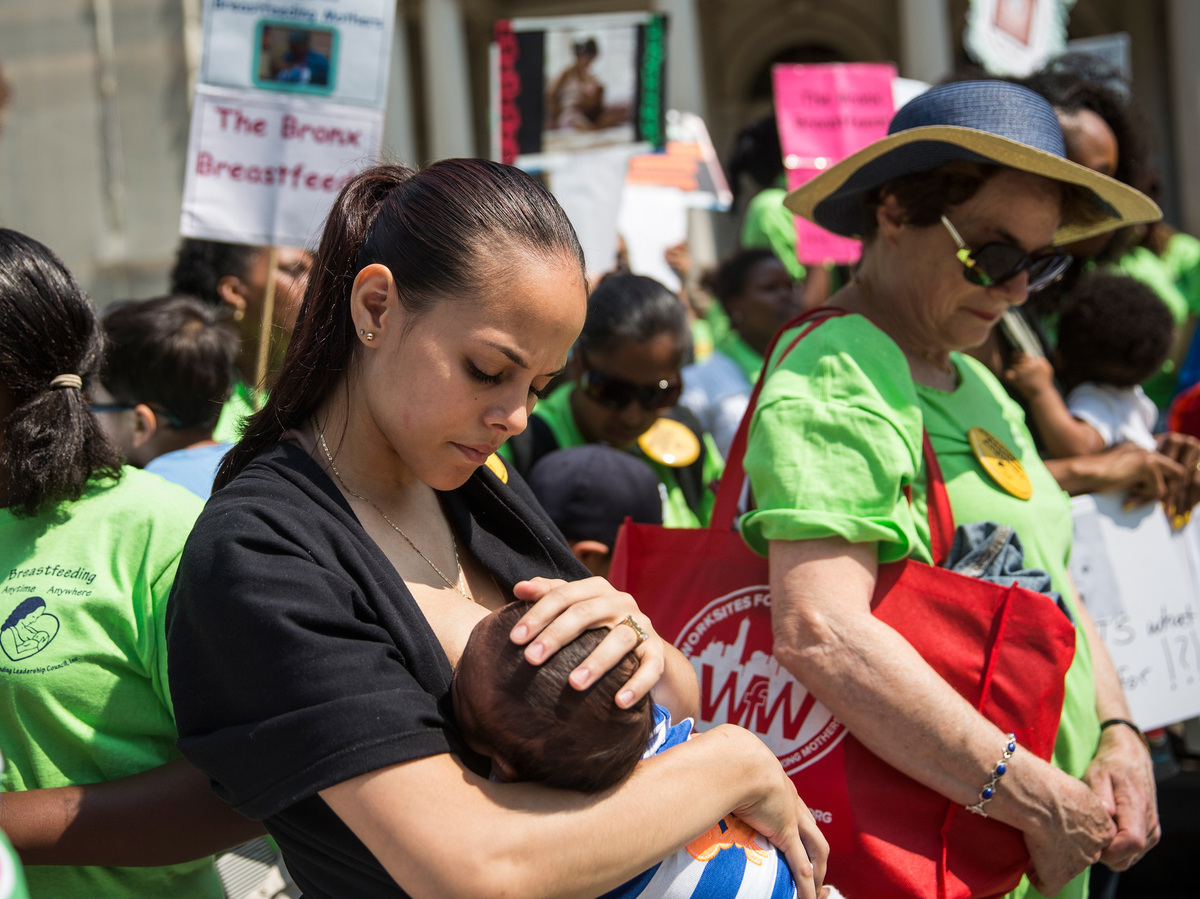The baby formula shortage is prompting calls to increase support for breastfeeding : NPR
[ad_1]

The newborn-components lack has led some to question why the U.S. won’t present more support for breastfeeding. Listed here, a woman breastfeeds her son exterior New York City Hall during a 2014 rally to help breastfeeding in community.
Andrew Burton/Getty Images
hide caption
toggle caption
Andrew Burton/Getty Images

The toddler-formula lack has led some to question why the U.S. isn’t going to supply additional assist for breastfeeding. Right here, a lady breastfeeds her son outdoors New York Town Corridor during a 2014 rally to assist breastfeeding in community.
Andrew Burton/Getty Photos
Mom and dad are scrambling to locate infant method. Factories are performing around the clock to make additional. And armed forces cargo planes are airlifting components from abroad.
Frequently ignored, although, in the race to fill the hole still left when a major system manufacturing unit closed due to suspected contamination is the most purely natural substitute: mother’s milk.
“If we did additional to guidance breastfeeding, we wouldn’t be in this mess,” claims Dr. Melissa Bartick, an assistant professor at Harvard Healthcare Faculty.
The American Academy of Pediatrics endorses that most toddlers be fed completely with breast milk for the 1st six months. But in 2018, only about one particular in 4 infants born in the U.S. achieved that goal.
There are a range of good reasons households change to supplemental method or prevent nursing completely. But Bartick suggests aggressive promoting by formulation makers is partly to blame.
“The formula makers would just give tons and tons of cost-free components to the healthcare facility to check out to provide their model and have the hospitals mail the mothers home with present luggage whole of formulation, so if they operate into any trouble at property they just pop in a prepared-to-feed bottle in the toddler, and that begins the mother getting to be dependent on method,” Bartick says.
Some hospitals now restrict system giveaways in an energy to inspire breastfeeding. But the $55 billion components field finds imaginative workarounds, in the U.S. and abroad.
“Frankly, they have way, way a lot more money than us,” claims Bartick, who has held management posts in the American General public Well being Affiliation and the U.S. Breastfeeding Committee. “And we can not struggle that.”
Bartick started researching and selling the well being advantages of breastfeeding soon after she gave start and ran into roadblocks at the healthcare facility although making an attempt to nurse her youngster extra than two many years back.
“I thought it would be type of a maternity leave challenge, but in this article I am, 23 years later on, however working on it,” she says with a rueful giggle.
Half the formula marketed in the U.S. is paid out for by the federal government to help very low-earnings households while the Agriculture Department’s Special Supplemental Nutrition System for Girls, Infants and Small children. Infants that acquire that subsidized method via the WIC application are a lot less probable to at any time breastfeed than those people who really don’t.
In addition, the U.S. government has fought for decades towards restrictions on abroad formula advertising. When the Planet Well being Group adopted a non-binding code of carry out to restrict formula promotion in 1981, the United States forged the lone vote towards it.
This year’s scarcity has forged a severe new highlight on the system market, while. The Federal Trade Fee has introduced an inquiry into how a handful of companies came to dominate the market place. And Agriculture Secretary Tom Vilsack, who oversees the WIC application, acknowledged the will need for a more robust provide chain.
“The obstacle for those of us in government is to figure out strategies we can master from this practical experience,” Vilsack explained to reporters past week, as he greeted an Air Power C-17 carrying 78,000 lbs of formulation rushed in from Switzerland.
“We are not as resilient as we should be,” he extra.
Breastfeeding advocates say the finest way to create resilience is apparent.
“The breast is the shortest offer chain,” says Kadee Russ, an economist at the College of California, Davis.
Russ is quick to accept that not every single mum or dad can breastfeed, or wants to. But when 84% of new moms begin breastfeeding, six in ten cease previously than they’d like. Russ factors to a variety of aspects, such as as well minimal coaching from overall health treatment companies, far too couple pumping options at work, and also minor paid out household depart.
“It truly is a little little bit demoralizing when you have a infant and you are speaking to your mates in these other nations and they’re heading to have a calendar year of leave to nurse their small children and you will not,” Russ suggests. “It is really not quick to breastfeed. Moms want help. It is not an uncomplicated process. It is perform.”
Dr. Bartick argues that boosting breastfeeding charges would convey sizeable well being treatment savings, considering the fact that nursing infants undergo significantly less from ear bacterial infections, diarrhea, being overweight and other conditions.
But Russ notes that developing the financial circumstance for breastfeeding needs a much more inclusive sort of accounting.
“If you invest in components, that goes into GDP as a transaction,” she claims. “Breastfeeding isn’t [included]. And in fact, what may possibly clearly show up in national economic figures is that you may well be performing much less.”
Russ suggests it is really short-sighted to count the financial price of increasing paid go away, for case in point, with out considering the offsetting benefits of enhanced access to breastfeeding.
“I feel that it is important to realize that breast milk is component of food stuff techniques,” Russ suggests. “It is a supply chain in itself.”
Boosting breastfeeding charges won’t address the fast formulation lack. But the memory of empty retail outlet cabinets might prompt some people to consider a 2nd look at formula’s primary levels of competition.
[ad_2]
Source website link








